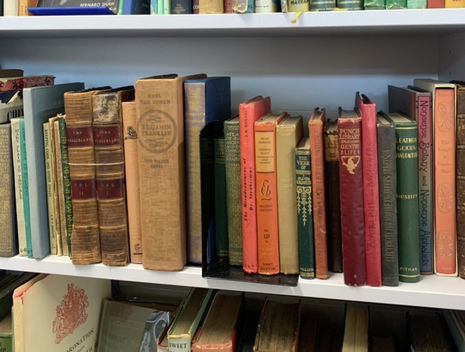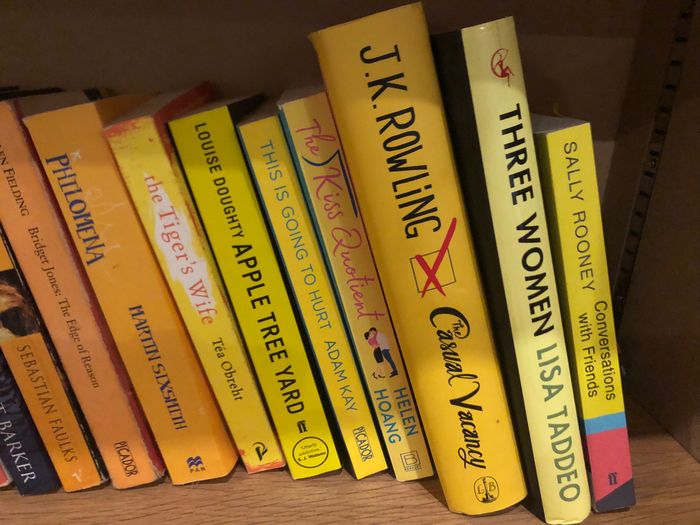New Year, new reading list
Is reading more books one of your resolutions? No fear – the Arts team are here with their top picks to help you battle those January blues

It’s January. The excitement of the recent festivities has died down, and in its wake remains a slight hangover, a load of discarded wrapping paper, and a sense of impending doom as you remember that you’ve entirely neglected your pre-reading for the upcoming term. It’s all a bit much, isn’t it? Well, don’t worry – the Arts team have got you sorted with the perfect reads to take you into the new year feeling refreshed and ready for anything.
Wise Children by Angela Carter (1991) – Emily (Senior Arts editor)
Carter’s final novel has the same worn-in, cheeky energy as a really good afters, and fizzes with energy and mirth like a cheap bottle of prosecco. Told from the perspective of an ex-showgirl, the story follows two interlinking families, the highbrow Hazards and the lowbrow Chances. Their performance exploits trace the whole globe, from the bright lights of Hollywood to the dim bulbs of south London’s clubs. A story about Shakespeare, music hall, love and rebirth, Wise Children is the perfect regenerative novel to ring in the new year. As the novel’s septuagenarian protagonist, Dora Chance, would say, we all sometimes need to be reminded of what a joy it is to dance and sing.
The Ocean at the End of the Lane by Neil Gaiman (2013) – Leo (Deputy Arts editor)
A few days ago, I watched a farm girl fight an eldritch monster, Stranger Things-style. It was terrifying, it was beautiful, and it was the best play I’ve ever seen. This is the world of The Ocean at the End of the Lane – touring now as a play with National Theatre but taken from a novel by Neil Gaiman. It’s a fanged, fantastical world where duck ponds can be oceans and kittens can be harvested like carrots. It’s also, quite literally, a trip down memory lane. Ocean is narrated by a middle-aged man through the memories of his seven-year-old self. In memory, he finds not only magic and myth, but grief, and fear, and family. In Gaiman’s own words, “at its heart” it’s a story “about survival”. Whether you encounter it by stage or page, it’s a story that will swallow you whole.
“It’s a story that will swallow you whole”
The Edwardians by Vita Sackville-West (1930) – Eve (Arts writer)
New Year encourages us to break with what, in the past, seemed impossible to leave behind (procrastination, bad habits, joining your DoS Zoom meeting on mute) and invite fresh possibilities. The Edwardians distils this spirit into a sumptuous, ultimately moving novel about the end of an era and one man’s efforts to escape predestination. Handsome and disaffected, Sebastian, Vita Sackville-West’s young duke, serves as an unlikely reminder that when life feels at once too much and going nowhere, you can always start a love affair. Warning: he’s an Oxonian.
“When life feels at once too much and going nowhere, you can always start a love affair”
I Stared at the Night of the City by Bachtyar Ali (2008) – Imaan (Arts writer)
Four friends band together to write a “book of death” and uncover the truth behind a murder, amid increasing authoritarianism in Iraqi Kurdistan. The first Kurdish novel to be translated into English, it combines magical realism with memorable characters: a reformed, rosewater-making assassin, a poet who writes spellbinding ghazals, a carpet-weaver and a man who takes blind children on imaginary sea journeys. The novel is a splash of rosewater on a stuffy day and its whimsical elements make it the perfect break from uni reading.
@neilhimself on instagram
The Lonely City by Olivia Laing (2016) – Jamie (Arts writer)
Olivia Laing always manages to pull off something spectacular – from her examination of art and its artists, she draws out an unassuming and empathetic reading of the human experience. In The Lonely City, Laing charts the lives of Andy Warhol, Edward Hopper, and others, exploring how they represent the experience of loneliness and the difficulty of forming connections in urban spaces. Winter can be a season of isolation, and slotting into our social circles again after six weeks away from Cambridge can feel daunting, but, as Laing says: “There isn’t any shame in that. Loneliness is a special place … intrinsic to the very act of being alive.”
Lie With Me by Philippe Besson, translated by Molly Ringwald (2017) – Grace (Arts writer)
Both nostalgic for lost youth and full of young love’s hopefulness, Lie with Me is the perfect short read for those wistful January evenings. Translated from French by Molly Ringwald, this novel sensitively captures the intimacy and intensity of a first relationship complicated by class differences and shame in a tiny rural town. In barely over a hundred pages, the breathtaking writing immerses you in the anticipation, passion and pain of the clandestine affair between two teenage boys. Each twist in their tale comes as a biting shock, despite the underlying sense of unavoidable heartbreak as a writer is suddenly plunged into memories of his first lover. Besson’s reflections on a relationship rendered impossible by the inescapability of fate will leave you hating this book for shattering your soul – while savouring every word.
The Unabridged Journals of Sylvia Plath by Sylvia Plath (2000) – Michelle (Arts writer)
To aspiring writers and journalists, I recommend leafing through The Unabridged Journals of Sylvia Plath: “My God, Cambridge is full of scientists, printing presses, theatre groups, and all I need is guts to write about them … Perhaps I’ll try out for Varsity next term.” Plath kept a diary while studying at Newnham College, documenting her experience and reflecting on womanhood, her career and the rejections she faces. She also sketches out ideas for a novel which later will become The Bell Jar. Her diaries are a gentle reminder that all writing takes courage.
Why be happy when you could be normal? by Jeanette Winterson (2011) - Famke Veenstra-Ashmore (Editor-in-Chief)
As a memoir enthusiast, my discovery of Winterson’s memoir in my local Oxfam for £2 was a welcome one. Revisiting much of the same subject matter as her famous debut, Winterson writes with renewed perspective, incorporating a reframing of her troubled childhood with an urgent exploration of her identity. Her main subject is chronicling a discovery of her own – the truth about her birthparents. As a theme, adoption is treated both introspectively and with frankness, resulting in a deeply emotive narrative which was as moving as it was real.
 News / Cambridge study finds students learn better with notes than AI13 December 2025
News / Cambridge study finds students learn better with notes than AI13 December 2025 News / Cambridge Vet School gets lifeline year to stay accredited28 November 2025
News / Cambridge Vet School gets lifeline year to stay accredited28 November 2025 Science / Did your ex trip on King’s Parade? The science behind the ‘ick’12 December 2025
Science / Did your ex trip on King’s Parade? The science behind the ‘ick’12 December 2025 News / Uni Scout and Guide Club affirms trans inclusion 12 December 2025
News / Uni Scout and Guide Club affirms trans inclusion 12 December 2025 Arts / Modern Modernist Centenary: T. S. Eliot13 December 2025
Arts / Modern Modernist Centenary: T. S. Eliot13 December 2025











